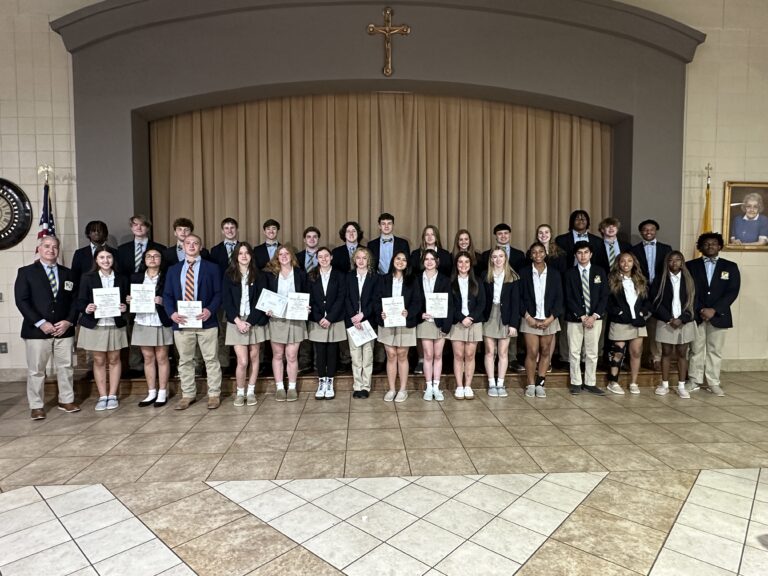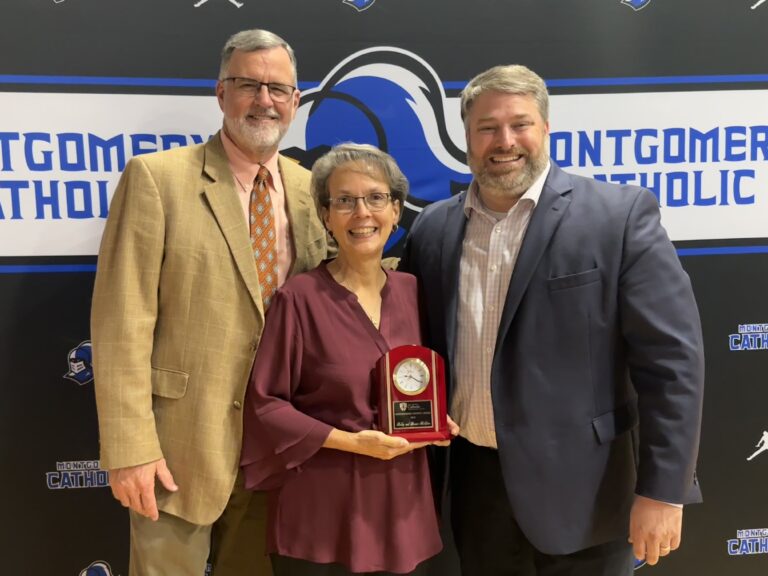Montgomery Catholic Preparatory School’s (MCPS) budding scientists came away winners at the South Alabama Regional Science Olympiad competition, hosted by the Spring Hill College in Mobile. For the second year in a row, the Knights won third place overall in the High School Division, and have been invited to compete in the State Competition on March 16 at Huntingdon College in Montgomery.
The team composed of students from freshmen to seniors, came away with 7 third place, 7second place, and 4 first place medals. M. Kathryn O’Connor, chair of the Science Department for MCPS and head coach said, “We had a tremendous amount of effort put forth by our entire team. Faculty, coaches, and parents provided guidance, but this was truly the result of study, perseverance and plain old hard work by our students.”
Earning individual honors were:
Brian Brunson – Water Quality 2nd, Fermi Questions 2nd, Rocks & Minerals 3rd
Brian Brunson – Water Quality 2nd, Fermi Questions 2nd, Rocks & Minerals 3rd
Baines Deal-Water Quality 3rd
Kenneth Dickerson- Forestry 2nd, Astronomy 3rd
Anne Faulkner-Forestry 2nd, Experimental Design 3rd
Berkeley Hall- Technical Problem Solving 2nd, Thermodynamics 3rd,
Water Quality 3rd
Zach Hulcher-Remote Sensing 1st, Dynamic Planet 2nd, Thermodynamics 3rd
Patrick McGinn- Circuit Lab 3rd
Allie Micher- Disease Detectives 2ndStone Miller-Experimental Design 3rd
Sarah Nolan-Circuit Lab 3rd and Experimental Design 3rd
Maddie O’Mara-Magnetic Levitation 1st,Gravity Vehicle 1st, Dynamic Planet 2nd,
Elastic Launch Glider 3rd
Elastic Launch Glider 3rd
Patrick O’Mara-Magnetic Levitation 1st, Gravity Vehicle 1st, Elastic Launch Glider 3rd
Leo Petters-Magnetic Levitation 1st, Remote Sensing 1st,
Technical Problem Solving 2nd
Technical Problem Solving 2nd
Willie Ravelo-Write It/Do It 1st, Thermodynamics 2nd, Fermi Questions 2nd
Robbie Sankey-Water Quality 2nd
Spencer Starr- Astronomy 3rd
Kristina Vanella-Disease Detectives 2nd
Chase Williams-Write It/Do It 1st, Thermodynamics 2nd
For over 25 years, Science Olympiad has led a revolution in science education. What began as a grassroots assembly of science teachers is now one of the premiere science competitions in the nation, providing rigorous, standards-based challenges to more than 5,300 teams in 48 states. Science Olympiad’s ever-changing event lineup — ranging from Disease Detectives to Magnetic Levitation to Thermodynamics — provides a buffet of career choices and exposure to practicing scientists and mentors. (www.soinc.org)





